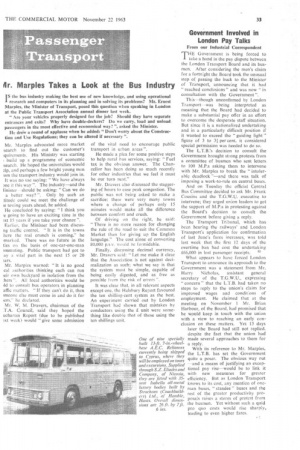Government Involved in London Pay Talks •
Page 35

If you've noticed an error in this article please click here to report it so we can fix it.
From our Industrial Correspondent
THE Government is being forced to I take a hand in the pay dispute between the London Transport Board and its busmen. After considering the men's claim for a fortnight the Board took the unusual step of passing the buck to the Minister of Transport, announcing that it had "reached conclusions" and was now "in consultation with the Government ".
This--though unconfirmed by London Transport—was being interpreted as meaning that the Board had decided to make a substantial pay offer in an effort to overcome the desperate staff situation. But since it is a nationalized undertaking and in a particularly difficult position if it wanted to exceed the "guiding light" figure of 3 to 31 per cent, it considered special permission was needed to do so.
The L.T.B.'s decision to consult the Government brought strong protests from a committee of busmen who sent letters to 100 M.P.s asking them to intervene with Mr. Marples to break the " intolerable deadlock "—and there was talk of imposing a work-to-rule on central buses.
And on Tuesday the official Central Bus Committee decided to ask Mr. Frank Cousins and the T.G.W.U. executive to intervene; they urged union leaders to get the support of M.P.s in protesting against the Board's decision to consult the Goyernmcnt before giving a reply.
The Transport Tribunal, which has been hearing the railways' and London Transport's application for confirmation of last June's fares increases, was told last week that the first 12 days of the overtime ban had cost the undertaking
66,000 in lost passenger receipts. • What appears to have forced London Transport to announce its approach to the Government was a statement from Mr. Harry Nicholas, assistant general secretary of the T.G.W.U., expressing concern" that the L.T.B. had taken no steps to reply to the union's claim for improved wages and condit:ons of employment. He claimed that at the meeting on November 1 Mr. Brian Harbour, of the Board, had promised that he would keep in touch with the union with a view to reaching an early conclusion on these matters. Yet 13 days later the Board had still not replied, despite the fact that the union had made several approaches to them for a reply.
With its reference to Mr. Marples, the L.T.B. has set the Government quite a poser. The obvious way out --and a means of justifying an exceptional pay rise--would be to link it with new measures for greater efficiency. But as London Transport knows to its cost, any mention of oneman buses, " standee " buses and the rest of the greater productivity proposals raises a storm of protest from the busmen. Yet without such a quid pro quo costs would rise sharply, leading to even higher fares.




































































































